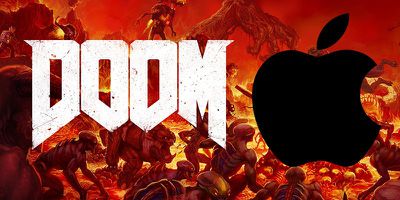John Carmack, best known for his work on iconic games that include Quake, Doom, and Wolfenstein 3D, today took to Facebook to share details on his interactions with Steve Jobs and to provide some insight into Jobs' opinion on gaming, what it was like working with Jobs, and what it felt like to participate in one of Jobs' famous keynotes.
Carmack first interacted with Jobs when Jobs was still at NeXT, because Carmack wanted to add a "Developed on NeXT computers" logo to the original Doom game. His request was initially denied, but later Jobs changed his mind. Doom never included a made on NeXT label, but Carmack did go on to work with Jobs on other projects.

Jobs, said Carmack, didn't appear to "think very highly of games" and seemed to wish "they weren't as important to his platforms as they turned out to be." Carmack was asked to discuss gaming requirements with Apple, and ended up having "a lot of arguments" with Jobs over the adoption of OpenGL. Jobs was good at talking with "complete confidence" about things he was "just plain wrong about."
Part of his method, at least with me, was to deride contemporary options and dare me to tell him differently. They might be pragmatic, but couldn't actually be good.
"I have Pixar. We will make something [an API] that is actually good." It was often frustrating, because he could talk, with complete confidence, about things he was just plain wrong about, like the price of memory for video cards and the amount of system bandwidth exploitable by the AltiVec extensions.
Carmack did convince Apple to adopt OpenGL, something Carmack says was "one of the biggest indirect impacts" on the PC industry that he's had, and he ended up doing several keynotes with Jobs. According to Carmack, keynotes were always a "crazy fire drill with not enough time to do things right."
At one point, Jobs asked Carmack to do a keynote that was scheduled on the day of his wedding, with Jobs going as far as asking Carmack to reschedule the event, which Carmack declined to do.
Carmack and Jobs' relationship began to fall apart after the launch of the iPhone, over a disagreement about web apps. Carmack was advocating for native apps while Jobs preferred web apps, leading to a heated dispute that later escalated when Carmack's comments were covered by the media.
People were backing away from us. If Steve was mad, Apple employees didn't want him to associate the sight of them with the experience. Afterwards, one of the execs assured me that "Steve appreciates vigorous conversation".
Still deeply disappointed about it, I made some comments that got picked up by the press. Steve didn't appreciate that. The Steve Jobs "hero / sh**head" rollercoaster was real, and after riding high for a long time, I was now on the down side. Someone told me that Steve explicitly instructed them to not give me access to the early iPhone SDK when it finally was ready.
Carmack developed several now-defunct iOS games, the last of which was Rage for iOS, and while he had "allies" within Apple, he was "on the outs with Steve" and never again conversed with the Apple CEO.
Carmack's full account of working with Steve Jobs, which can be found over on Facebook, is well worth reading for anyone interested in the history of Apple.





















